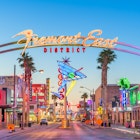
The northern lights are going to be named - and you can help choose them
Oct 28, 2020 • 2 min read

The northern lights over Norway © Justin Foulkes / Lonely Planet
Some people may dream of seeing their name up in lights, but what about the northern lights? The occurrences of the aurora borealis in Arctic Europe—which includes Finnish and Swedish Lapland, and northern Norway—will now be named, and you can even suggest a name by going to the This is Arctic website. If you’re lucky, your suggestion may one day light up the sky.
How to photograph the northern lights
The aurora borealis, or northern lights, is not merely a magical phenomenon in the night sky - it’s a solar storm of small particles interacting with the atmosphere. Auroras are born when sun storms send charged solar particles towards the Earth. In turn, electrons in the atoms transition to a higher energy state, and when they dip back to their usual state they release light. They manifest in an endless variety of colors and intensities, varying from subtle, almost ghost-like figures moving in the sky to a vibrant and intense multi-color light show.
“There’s more than 200 days a year that auroras happen,” said Jesse Ketonen, the communications manager for Visit Arctic Europe II. “But most of them you unfortunately can’t see because of factors like bad weather conditions, or they happen during the daylight.”

To determine which auroras will receive a name, the Space Weather Prediction Centre relies on a tool which analyzes the sun’s X-ray activity. Based on this data, they can detect that the strongest, more visible aurora occurrences will follow that activity by a day or two. Visit Arctic Europe will then select a name for that specific aurora borealis and publish it on their site and Instagram. They have a set pool of names that come from the region’s history, culture, and mythology, but they encourage people to submit their own non-Nordic inspired names as well.
“Culturally, the aurora is very important for the Nordic and Arctic region,” Jesse explained. In Norse mythology, for instance, the lights are linked to the dawn of creation, and Vikings believed the northern lights were the souls of fighting warriors. Even knowing the science behind how they happen, though, there is something magical about the aurora borealis. “We wanted for other people to have the opportunity to participate.”
With 2020 being a particularly challenging year, making this experience something that can be shared and discussed shines a glimmer of hope. People can talk about specific auroras by name and share photos on social media with that exact hashtag, like #AuroraHarri.
“Auroras have had meaning for local people and visitors for as long as we can remember,” Jesse said. “We wanted to start naming them to give them an even better reverence when you go back to your memories. And we did it for the local community, too, to share the experience around the world.” You can find out more here.
Read more:
How to photograph the northern lights
A mountain biker shares how Nordic Europe combines the best of food and biking
Explore related stories





 Destination PracticalitiesThe best time to go to Italy: plan your trip with our seasonal guide
Destination PracticalitiesThe best time to go to Italy: plan your trip with our seasonal guideDec 3, 2024 • 7 min read

 Tips & AdviceThe 15 best places to visit in Italy, from Venice to the Cinque Terre
Tips & AdviceThe 15 best places to visit in Italy, from Venice to the Cinque TerreDec 3, 2024 • 11 min read










